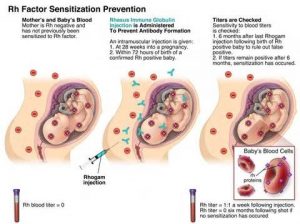Risks of blood transfusion, Importance of studying blood groups & Rhesus factor (Rh)
Risks of blood transfusion
When the transfused blood to a person is incompatible with his blood group , Some symptoms appear on him, Such as Shiver, Headache, Chest pains, Breathlessness, Blueness, Tachycardia, Hypotension and these symptoms often end with death.
A viral infection can be transferred to the receiver as Hepatitis C , AIDS virus, So, when the blood is transfused, a range of blood tests must be carried out on the donor’s blood to make sure that it is compatible with receiver’s blood group and it is free of pathogens , such as viruses .
Importance of studying blood groups
Despite resolution in determining paternity and enrollment children to their real parents ( blood groups can denying but cannot prove the parentage).
Determining the process of blood transfusion among individuals, It is used in studies of human race taxonomy and studying evolution .
Rhesus factor ( Rh )
Rhesus factor is a type of antigens on the surface of red blood cells, beside the antigens of blood groups , Humans are classified according to the presence of Rhesus factor in their blood into Positive Rhesus factor (Rh+) and Negative Rhesus factor (Rh−).
Positive Rhesus factor (Rh+): Their blood contains Rhesus factor, They represent about 85 % of human beings.
Negative Rhesus factor (Rh−): Their blood is free from Rhesus factor , They represent about 15 % of human beings.
Inheritance of Rhesus factor
The inheritance of Rhesus factor antigens is controlled by three pairs of genes carried on one pair of chromosomes .
The presence of one or more of these three gene pairs in the dominant state leads to the formation of Rhesus factor antigens and the person becomes positive Rhesus factor (Rh+) , whereas all genes of the negative Rhesus factor individual (Rh−) are recessive .
Importance of Rhesus factor
Avoiding risks arising from the formation of antibodies against the antigens of Rhesus factor that cause disintegration of red blood cells , Therefore , determination of Rhesus factor should not be neglected before blood transfusion process and before marriage .
Role of Rhesus factor in pregnancy and delivery
If Rh+ man is married to Rh− woman and she becomes pregnant with Rh+ fetus , the following takes place :
In the first pregnancy , a portion of fetus blood ( Rh+) mixes with his mother’s blood and stimulates her immune system to produce antibodies against the antigens of Rhesus factor which do not harm this embryo and these antibodies remain in mother’s blood .
In the second pregnancy , if the fetus is Rh+ , some antibodies move from mother’s blood to the blood of fetus across her placenta and cause disintegration of fetus red blood cells and infecting him with severe anaemia that may lead to his death.
The preventive measure in case of discovering this case before the delivery of the first baby :
Injecting the mother with a protective serum through 72 hours after each birth to the future baby, where this serum disintegrates the blood containing ( Rh+ ) that mixed with mother’s blood ( from the previous embryo ) before enhancing the mother’s immune system to form the antibodies.
Blood groups, Rh blood groups, Erythroblastosis fetalis & Importance of Rh factor
Complementary genes, Lethal genes and Effect of environmental conditions on action of some genes
Blood pressure , structure , functions & Mechanism of blood clotting





